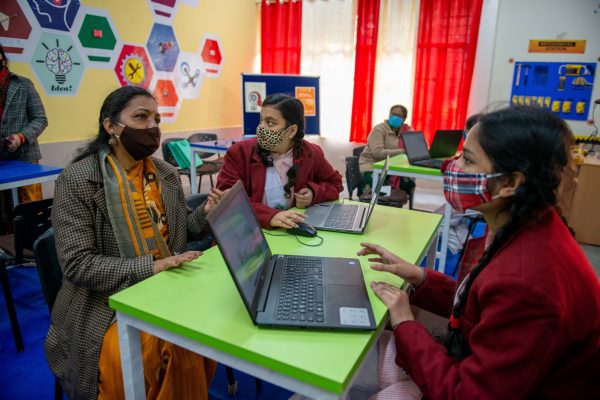Yet, this is not the first instance where the Government of the National Capital Territory of Delhi (GNCTD) has neglected to uphold fundamental socioeconomic rights. On 7 June 2020 the GNCTD announced a policy to restrict hospital admissions to Delhi residents only — discriminating against its non-residents.
Since March 2020, teachers have been tasked with data collection, including conducting house-to-house surveys, as well as the distribution of rations to migrant labourers. As a result, teachers have been unable to teach. In some areas, there is only 1 teacher for every 1000 students — making it impossible to teach let alone assess and evaluate students in government schools.
While the debate over COVID-19 challan duties being allotted to government school teachers has revolved around the ‘dignity of work’, the impact of such policy decisions on the right to education — a fundamental right expressly guaranteed under Article 21A of the Indian Constitution — has yet to be examined. This is despite the fact that there are over 1.8 million students enrolled in government schools under the control of the GNCTD.
The GNCTD’s policy is in direct contravention of the 2009 Right to Education Act (RTE Act). As per the Act, it is the obligation of the government to ensure that good quality education is provided to students. According to the RTE Act’s Schedule, teachers must work for a minimum of 45 hours per week. Yet, as the government assigns school teachers COVID-19 duties, meeting these standards has become difficult, if not impossible.
The policy will increase the education gap between those relying on state-sponsored education and those with access to private education. It will also result in higher dropout rates from government schools. A 2018 report showed that dropout rates among students in Delhi government schools were already on the rise despite efforts made by the government to increase enrolment.
The COVID-19 pandemic is making the situation worse. The government has failed to take adequate measures to help students continue their studies safely during the pandemic, such as any provision of tablets or laptops to poor students studying in Delhi government schools.
Moreover, the midday meal policy launched to ensure food security and maintain the nutrition levels of students in government schools remains suspended.
The scheme is seen as boosting enrolment in schools. It also gave relief to poor households as the burden of feeding children was alleviated by government schools. In the early days of the pandemic, GNCTD officials made assurances that the money for midday meals would be transferred to the bank accounts of eligible households, but no money has been transferred since April 2020.
The situation was eventually taken up before the Delhi High Court, where the GNCTD filed an affidavit claiming the proper implementation of its midday meal scheme during the pandemic. The Court found discrepancies in the affidavit and directed the GNCTD to resubmit.
The problem is that the government believes that such schemes can have measurable and direct impacts on education — but this is not a nuanced understanding of a phenomenon as complex as education.
By contrast, Amartya Sen’s approach would focus on the individual’s ability to convert resources into real opportunities. Individual capabilities arise out of ‘real freedom’ and not just ‘formal freedoms’. An individual requires not just the formal freedom to do or be something but also the socioeconomic opportunities to achieve it.
As the GNCTD assigns teachers COVID-19 duties, the right to education for the majority of students in Delhi’s government schools has become a mere formal freedom — reducing their actual opportunities to achieve their capabilities.
Although the Government School Teachers Association argues that the removal of teachers from their COVID-19 duties would be in the interest of school students, no steps seem to have been taken to reverse the situation.
The state of affairs is perhaps worse on the healthcare front. On 7 June 2020, the Chief Minister of Delhi, Arvind Kejriwal, announced that the city’s public and private hospitals would only be accessible to residents of Delhi. This not only excludes non-residents from accessing their right to health, but also risks worsening the spread of COVID-19.
Unlike the right to education, there is no specific provision guaranteeing the right to health. It was only after a series of judgments that the Supreme Court considered the right to health as a fundamental right guaranteed under the Article 21 of the Constitution, the right to life and liberty. A day later on 8 June 2020, the decision of the Chief Minister was overruled by the Lieutenant Governor of Delhi, Anil Baijal — making Delhi’s hospitals accessible to all.
When the Aam Aadmi Party came to power in Delhi in 2014, it touted itself as the champion of the poor by promising to secure socioeconomic rights such as healthcare and education. Yet, since the beginning of the pandemic, the Delhi government seems to have taken the opposite approach. There is an urgent need for the GNCTD to find more effective COVID-19 containment measures while upholding the socioeconomic rights of its citizens to education and health.
Shivkrit Rai is a lawyer practicing in the Delhi High Court and Tribunals.

